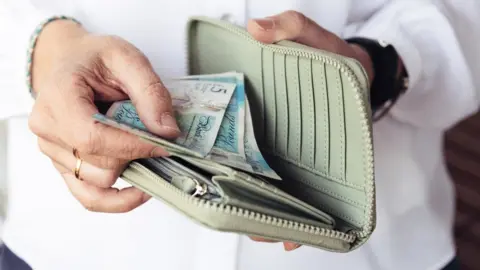'A £100 loan turned into nearly £1,000 a month'
 Getty Images
Getty ImagesFamilies struggling to keep up with the rising cost of living are being warned of the dangers of loan sharks.
The Stop Loan Sharks agency said more than half of victims it helped last year had borrowed to pay for essentials like food and fuel.
The warning comes as UK prices rise at their fastest rate in 40 years.
One woman told the BBC she borrowed £100 from a neighbour's sister and found herself paying back nearly £1,000 a month - almost all of her pay packet.
Kelly, not her real name, could cover the bills. But with growing children, the fridge was emptied as quickly as she could fill it.
But after taking up the "kind" offer of borrowing £100, the demand to repay £325 came the next month, which made it even harder for Kelly to manage.
"Because it left me a bit short I'd borrow again," she says. "And then I just kept borrowing and borrowing, just to keep myself afloat."
She was also being charged exorbitant interest rates on other payments that she had not requested.
"There'd be times when I'd wake up in the morning and I'd check my bank and there'd just be a random £100 in my bank. It got me more down because she wouldn't let me send it back."
Eventually, Kelly says she was subject to threats. She was told that a gang was in charge of her loan shark, and if she didn't repay the full amount then her family would suffer.
About £900 of her monthly salary of £1,048 was going straight to the loan shark. Kelly says she frequently thought of taking her life, as her family were hanging on by a thread.
"When we went into lockdown in 2020, when we got those food vouchers from the school - that's how we survived, just off those vouchers," she says.
Informal one-off loans between friends are not against the law. But lending to lots of people, often with no paperwork, high interest and using threats to get those repayments is illegal.
With more people struggling this year, and payday loan companies such as Wonga and Quickquid no longer operating, the concern is that more people will turn to illegal lenders to make ends meet.
Figures from the England Illegal Money Lending Team, the government agency behind Stop Loan Sharks, state that nearly one in 10 of those who borrowed money from loan sharks last year did so to cover the costs of Christmas.
Cath Williams from Stop Loan Sharks says that the number of people turning to illegal lenders has increased significantly over the last decade and the cost-of-living crisis is a big worry.
It has supported more than 400 victims through the process of gathering evidence and prosecuting loan sharks in the first six months of this year.

What should you do if you're a victim of a loan shark?
The first thing to be clear on is that you have not committed a crime. You are a victim.
Most people do not realise that they are borrowing from a loan shark to start with. They think the person is a friend or a neighbour, so if it took you a while to realise this was a loan shark, then you're not alone.
You can ring the Stop Loan Sharks helpline or visit their website to report a loan shark in confidence, or to get advice.
If a loan shark turns up at your home, or you are in immediate danger, it is best to contact the emergency services.
It's also worth remembering that friends and family may be the best people to spot if someone has become a victim of a loan shark. If you are concerned about them, you can refer them to Stop Loan Sharks too.

"For the first time we're seeing people turn to illegal lenders for food and fuel," says Ms Williams, with more than half of the people they have helped borrowing from a loan shark to pay for essentials.
"Historically it's always been everyday living expenses, things like white goods, tyres or school uniforms, but now for over half of the people we supported in the first half of this year are borrowing from loan sharks for food and fuel."
The agency, which works with police to secure prosecutions and provides emotional support to victims, says that high inflation, energy bills and the additional big pressure of Christmas is a perfect storm.
"Loan sharks will spot a vulnerability and they will prey on it. They're not running affordability checks, they don't care if you pay your rent or can put food on the table. They just want to take as much of your money as possible to feed their greed," Ms Williams says.
She also advises against getting a friend or family member to pay off the debt as "it just highlights you've got access to cash".
"The best thing a friend can do is support them to come to us."
In the end, that's exactly what Kelly did. With the help of friends and her housing association, she made the call to Stop Loan Sharks and she started to piece her life back together.
"The only advice I'd give is get help straight away, it's never too late, don't put yourself through it."


